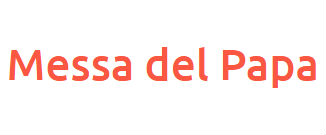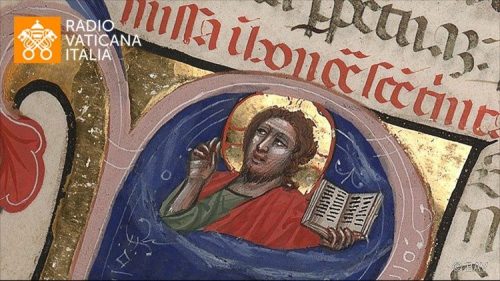READING OF THE DAY
2 SM 7:1-5, 8B-12, 14A, 16
When King David was settled in his palace,
and the LORD had given him rest from his enemies on every side,
he said to Nathan the prophet,
“Here I am living in a house of cedar,
while the ark of God dwells in a tent!”
Nathan answered the king,
“Go, do whatever you have in mind,
for the LORD is with you.”
But that night the LORD spoke to Nathan and said:
“Go, tell my servant David, ‘Thus says the LORD:
Should you build me a house to dwell in?
“‘It was I who took you from the pasture
and from the care of the flock
to be commander of my people Israel.
I have been with you wherever you went,
and I have destroyed all your enemies before you.
And I will make you famous like the great ones of the earth.
I will fix a place for my people Israel;
I will plant them so that they may dwell in their place
without further disturbance.
Neither shall the wicked continue to afflict them as they did of old,
since the time I first appointed judges over my people Israel.
I will give you rest from all your enemies.
The LORD also reveals to you
that he will establish a house for you.
And when your time comes and you rest with your ancestors,
I will raise up your heir after you, sprung from your loins,
and I will make his Kingdom firm.
I will be a father to him,
and he shall be a son to me.
Your house and your Kingdom shall endure forever before me;
your throne shall stand firm forever.'”
GOSPEL OF THE DAY
LK 1:67-79
Zechariah his father, filled with the Holy Spirit, prophesied, saying:
“Blessed be the Lord, the God of Israel;
for he has come to his people and set them free.
He has raised up for us a mighty Savior,
born of the house of his servant David.
Through his prophets he promised of old
that he would save us from our enemies,
from the hands of all who hate us.
He promised to show mercy to our fathers
and to remember his holy covenant.
This was the oath he swore to our father Abraham:
to set us free from the hand of our enemies,
free to worship him without fear,
holy and righteous in his sight
all the days of our life.
You, my child, shall be called the prophet of the Most High,
for you will go before the Lord to prepare his way,
to give his people knowledge of salvation
by the forgiveness of their sins.
In the tender compassion of our God
the dawn from on high shall break upon us,
to shine on those who dwell in darkness and the shadow of death,
and to guide our feet into the way of peace.”
WORDS OF THE HOLY FATHER
Joseph with Mary his spouse, went up “to the city of David called Bethlehem” (Lk 2:4). Tonight, we too, go to Bethlehem, there to discover the mystery of Christmas.
Bethlehem: the name means house of bread. In this “house”, the Lord today wants to encounter all mankind. He knows that we need food to live. Yet he also knows that the nourishments of this world do not satisfy the heart. In Scripture, the original sin of humanity is associated precisely with taking food: our first parents “took of the fruit and ate”, says the Book of Genesis (cf. 3:6). They took and ate. Mankind became greedy and voracious. In our day, for many people, life’s meaning is found in possessing, in having an excess of material objects. An insatiable greed marks all human history, even today, when, paradoxically, a few dine luxuriantly while all too many go without the daily bread needed to survive.
Bethlehem is the turning point that alters the course of history. There God, in the house of bread, is born in a manger. It is as if he wanted to say: “Here I am, as your food”. He does not take, but gives us to eat; he does not give us a mere thing, but his very self. In Bethlehem, we discover that God does not take life, but gives it. To us, who from birth are used to taking and eating, Jesus begins to say: “Take and eat. This is my body” (Mt 26:26). The tiny body of the Child of Bethlehem speaks to us of a new way to live our lives: not by devouring and hoarding, but by sharing and giving. God makes himself small so that he can be our food. By feeding on him, the bread of life, we can be reborn in love, and break the spiral of grasping and greed. From the “house of bread”, Jesus brings us back home, so that we can become God’s family, brothers and sisters to our neighbours. Standing before the manger, we understand that the food of life is not material riches but love, not gluttony but charity, not ostentation but simplicity.
The Lord knows that we need to be fed daily. That is why he offered himself to us every day of his life: from the manger in Bethlehem to the Upper Room in Jerusalem. Today too, on the altar, he becomes bread broken for us; he knocks at our door, to enter and eat with us (cf. Rev 3:20). At Christmas, we on earth receive Jesus, the bread from heaven. It is a bread that never grows stale, but enables us even now to have a foretaste of eternal life.
In Bethlehem, we discover that the life of God can enter into our hearts and dwell there. If we welcome that gift, history changes, starting with each of us. For once Jesus dwells in our heart, the centre of life is no longer my ravenous and selfish ego, but the One who is born and lives for love. Tonight, as we hear the summons to go up to Bethlehem, the house of bread, let us ask ourselves: What is the bread of my life, what is it that I cannot do without? Is it the Lord, or something else? Then, as we enter the stable, sensing in the tender poverty of the newborn Child a new fragrance of life, the odour of simplicity, let us ask ourselves: Do I really need all these material objects and complicated recipes for living? Can I manage without all these unnecessary extras and live a life of greater simplicity? In Bethlehem, beside where Jesus lay, we see people who themselves had made a journey: Mary, Joseph and the shepherds. Jesus is bread for the journey. He does not like long, drawn-out meals, but bids us rise quickly from table in order to serve, like bread broken for others. Let us ask ourselves: At Christmas do I break my bread with those who have none?
After Bethlehem as the house of bread, let us reflect on Bethlehem as the city of David. There the young David was a shepherd, and as such was chosen by God to be the shepherd and leader of his people. At Christmas, in the city of David, it was the shepherds who welcomed Jesus into the world. On that night, the Gospel tells us, “they were filled with fear” (Lk 2:9), but the angel said to them “Be not be afraid” (v. 10). How many times do we hear this phrase in the Gospels: “Be not afraid”? It seems that God is constantly repeating it as he seeks us out. Because we, from the beginning, because of our sin, have been afraid of God; after sinning, Adam says: “I was afraid and so I hid” (Gen 3:10). Bethlehem is the remedy for this fear, because despite man’s repeated “no”, God constantly says “yes”. He will always be God-with-us. And lest his presence inspire fear, he makes himself a tender Child. Be not afraid: these words were not spoken to saints but to shepherds, simple people who in those days were certainly not known for their refined manners and piety. The Son of David was born among shepherds in order to tell us that never again will anyone be alone and abandoned; we have a Shepherd who conquers our every fear and loves us all, without exception.
The shepherds of Bethlehem also tell us how to go forth to meet the Lord. They were keeping watch by night: they were not sleeping, but doing what Jesus often asks all of us to do, namely, be watchful (cf. Mt 25:13; Mk 13:35; Lk 21:36). They remain alert and attentive in the darkness; and God’s light then “shone around them” (Lk 2:9). This is also the case for us. Our life can be marked by waiting, which amid the gloom of our problems hopes in the Lord and yearns for his coming; then we will receive his life. Or our life can be marked by wanting, where all that matters are our own strengths and abilities; our heart then remains barred to God’s light. The Lord loves to be awaited, and we cannot await him lying on a couch, sleeping. So the shepherds immediately set out: we are told that they “went with haste” (v. 16). They do not just stand there like those who think they have already arrived and need do nothing more. Instead they set out; they leave their flocks unguarded; they take a risk for God. And after seeing Jesus, although they were not men of fine words, they go off to proclaim his birth, so that “all who heard were amazed at what the shepherds told them” (v. 18).
To keep watch, to set out, to risk, to recount the beauty: all these are acts of love. The Good Shepherd, who at Christmas comes to give his life to the sheep, will later, at Easter, ask Peter and, through him all of us, the ultimate question: “Do you love me?” (Jn 21:15). The future of the flock will depend on how that question is answered. Tonight we too are asked to respond to Jesus with the words: “I love you”. The answer given by each is essential for the whole flock.
“Let us go now to Bethlehem” (Lk 2:15). With these words, the shepherds set out. We too, Lord, want to go up to Bethlehem. Today too, the road is uphill: the heights of our selfishness need to be surmounted, and we must not lose our footing or slide into worldliness and consumerism.
I want to come to Bethlehem, Lord, because there you await me. I want to realize that you, lying in a manger, are the bread of my life. I need the tender fragrance of your love so that I, in turn, can be bread broken for the world. Take me upon your shoulders, Good Shepherd; loved by you, I will be able to love my brothers and sisters and to take them by the hand. Then it will be Christmas, when I can say to you: “Lord you know everything; you know that I love you” (cf. Jn 21:17).
(Solemnity of the Nativity of The Lord, 24 December 2018)

